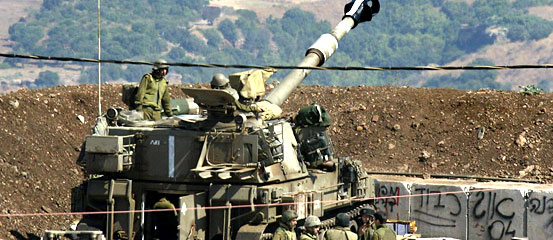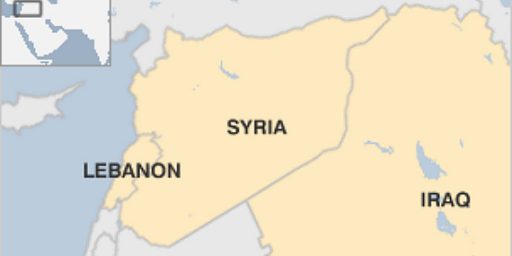Israel Invades Lebanon
Israel has invaded Lebanon in retalliation for Hezbollah’s kidnapping of two Israeli soldiers.

Hizbollah guerrillas captured two Israeli soldiers and killed up to seven Israelis in violence on either side of the Lebanese border on Wednesday, further inflaming Middle East tensions.
Israeli Prime Minister Ehud Olmert described the Hizbollah attacks as an “act of war” by Lebanon and promised a “very painful and far-reaching” response. Two Lebanese civilians were killed and five people wounded in retaliatory Israeli air strikes after Hizbollah announced it had captured the Israelis. Israeli ground forces crossed into Lebanon to search for the captured soldiers, Israeli Army Radio said. Hizbollah and the Lebanese authorities said there was no large-scale incursion.
Israeli troops have not struck deep into Lebanon since they withdrew from a southern border strip in 2000 after waging an 18-year war of attrition with Hizbollah’s Shi’ite fighters.
As in Gaza, Israel is giving the terrorists exactly what they want: War.
From an Israeli perspective, these actions are certainly understandable. At some point, Arab governments have to assume responsibility for terrorist groups operating within their borders. This is even more true in both Lebanan and Palestine, where the distinction between the governments and the terrorists is ephemeral.
One wonders, however, what the Israeli exit strategy is here. Total annihilation of Hezbollah and Hamas is impossible without genocide, given how organic they seem to be. Does Israel plan to annex and permanently occupy these territories? They’ve tried that without solving the terrorist problem. They also can’t go the route that the U.S. has gone in Iraq: The current governments are, in both cases, the result of the democratic process.
Israel has lived in a more-or-less permanent state of war since 1948. That does not look to change any time soon.
UPDATE: Steven Taylor has a similar take on the situation: “While there may well be a great deal of visceral satisfaction on the part of the Israelis as a result of these military actions, it is wholly unclear what the overall strategic goals are.” To the extent wars are fought for political ends, as Clausewitz taught us, that’s problematic.
UPDATE (Greg Tinti): ESCALATION: The JPost is reporting that the IDF is calling up reservists while Haaretz reports that senior IDF officials are willing to “regress” Lebanese civilian infrastructure by 20 to 50 years if the Lebanese government doesn’t intervene on behalf of the abducted soldiers. Here’s more from that analysis:
This is the most complex crisis Israel has faced since Operation Defensive Shield in 2002, when Israel successfully curbed Hezbollah’s bid to spark a confrontation on the northern border in response to the IDF occupation of West Bank cities.
The winning formula for resolving the crisis consisted of military actions combined with diplomatic pressure.
In some respects, however, the situation now is even more complicated than in 2002, because terror groups are holding three soldiers captive: Gilad Shalit in the Gaza Strip, and two other soldiers who were captured Wednesday morning on the northern border.
The attack on Israel’s northern border was an impressive military achievement for Hezbollah and a ringing failure for the IDF. Despite Israel’s intelligence analyses and despite wide operational deployment, Hezbollah has succeeded in carrying out what it has been threatening to do for more than two years – and it couldn’t have happened at a more sensitive time.
Israel has until now responded with restraint by bombarding bridges in central Lebanon and attacking Hezbollah positions along the border. But considering the nature of the military high command’s current evaluation of the situation, it is clear that the IDF is interested in inflicting a much sharper blow on Lebanon.
Senior officers in the IDF say that the Lebanese government is responsible for the soldiers’ abduction. According to the officers, if the kidnapped soldiers are not returned alive and well, the Lebanese civilian infrastructures will regress 20, or even 50 years.
Lebanon has invested considerable resources in the rehabilitation of its civilian infrastructures from the damage sustained during its civil war in the 1970s and the years of war with Israel throughout the 1980s and 1990s.
If Israel is having difficulty in deterring Hamas in Gaza, and certainly if it is unable to bring the crisis to a conclusion, indeed Hezbollah is a much more sophisticated and experienced rival than its Palestinian counterpart.
It is safe to assume that Hezbollah planned the abduction months in advance, and that the Shi’ite organization has made every effort to conceal the location where the kidnapped soldiers are being held.
From another perspective, however, the opening of a new front somewhat eases Israel’s dilemma. It now seems that the government may be able to stop acting like it is walking on eggshells, as it has thus far.
There is every indication that Israel is on its way to a wide escalation of its military operations, both in the north and in the Gaza Strip.
More updates courtesy of Allah Pundit over at Hot Air.






senior IDF officials are willing to â??regressâ?? Lebanese civilian infrastructure by 20 to 50 years
Bombing them into the Stoner Age?
I would keep an eye on Syria. If their endgame included toppling Assad, along with decimating the Hezbollah foot soldiers, hitting infrastructure and supply dumps, then they could pull back to their borders with something accomplished. Syria out would leave distant Iran as the next source of funds and material to rebuild the terrorist networks.
Bombing them into the Stoner Age?
I am thinking Jurassic without the dinosaurs…
It seems to me that this quote would be more accurate if you replaced the word war with the word warfare. H&H like mayhem, murder and the predictable one-sided condemnations of Israel that are already forthcoming. On the other hand, if Israel really went to war, with war defined in a sense that General Grant or General Patton might recognize, I’m less certain just how much H&H might like it. I am certain that the bloodshed and collateral damage is nothing that polite society today has much of a stomach for. But, of course, H&H has known that for years and depends on that for their marketing if not their very survival.
As an aside, can you imagine any of the names I dropped above discussing an “exit strategy” in any terms other standing down only after an unconditional surrender of the enemy? I’ve never understood the endless fascination with having an exit strategy in the earliest days any conflict. Didn’t Clausewitz also state that no battle plan survives contact with the enemy. Requiring an exit strategy now is like beginning a game of chess with moves 38-42 already decided, regardless of what the state of the board may actually be when you get there.
War is all hell, as someone else famous once said, but one of the recurring themes post WWII is that wars don’t really end until one side is unambiguously beaten so that they themsleves cannot deny it. Apparently, it’s kind of like any other 12-step program, you have to reach bottom and admit that you have a problem before you can ever start to get better. Until such time as H&H are treated as the geopolitical heirs of Nazism and Tojoism (for lack of a better word), and utterly defeated, these varying degrees of low to medium intensity conflicts will go on for-freakin’-ever.
Maybe Captain Kirk can reprise his role to stop the relatively low level attrition that has been going on for a long time and force both sides to get serious about living together … or not.
I could go on about your comment on genocide, but, hey, maybe I should get my own blog.
Charles, you are bang on in terms of exit strategy in history.
FDR took some heat when he announced unconditional surrender as the war goal in 1943 at Casablanca. Since WWII every big war (Korea, Vietnam, Cold War, Gulf War, and Iraq War) has had to deal with ‘exit strategies’ short of all out victory. You could make an argument that Iraq war was an all out victory followed by a long rebuilding with violence going on situation. With the exception of the Iraq war, all of those conflicts left the government we fought in power.
My personal exit strategy favorite was Halsey as he heard about Pearl Harbor. http://en.wikipedia.org/wiki/William_Halsey,_Jr.
“After this war the Japanese language would only be spoken in hell”
My apologies for the typos and grammatical errors in the above post. Maybe I need glasses, or less caffeine, or both.
“One wonders, however, what the Israeli exit strategy is here.”
Out the other side of Lebanon into Syria?
I fully support sending an unmistakable message about what happens when the populace supports terrorism.
I fully support sending an unmistakable message about what happens when the populace supports terrorism.
Would you be happy to see nuclear-armed US-allied India apply that to nuclear armed US-allied Pakistan as well? Because that’s what the Indian rightwing is calling for.
Regards, Cernig @ newshog
Charles, et. al: By “exit strategy” here I mean merely an endgame. While one might not have all the markers in mind at outset, it makes no sense to commence a military op unless one has in mind a status quo post bellum that would constitute “victory.”
Cernig,
The situations are not equivalent, never have been and never will be. Yawp!
Ozzie, would you like to read the link and then maybe explain your position?
Indian intelligence are saying the responsible groups are backed by Pakistan’s ISI intelligence agency. I’ve just finished reading an Indian conservative’s op-ed that reminds the world of Bush words – “‘We will make no distinction between the terrorists who committed these acts and those who harbour them” – and called upon the world to back India’s carrying through on those words.
Regards, C.
It might be worth floating the idea of an international consortium type government to rule the Palestinians for some extended period of time similar to the occupation of Germany after WWII, sans Israel being a party to that. That should not, however, be the UN. As an extension to this maybe the territories could be divided into a multitude of mini-states. With fences. One of the main problems is that anarchic nature of the Palestinian territories is that no area has the opportunity to devolve into a peaceful society; the threat from the madmen in their midst prevents it and for peace to be achieved these madmen need to be squeezed out of society. In addition, financial oversight would be enhanced and progress can be made on development. Miniature states might be the way.
But don’t bet on it.
I concur on wanting definite criteria to define victory, but history seems to show that anything less than the unconditional surrender of your enemy constitutes an eventual re-entry strategy.
Cernig,
I read the link and I understood what you said but I stand by my comment. Maybe I wasn’t as clear as I should have been.
The situation that Israel faces is not the same as India. You cannot truly compare the two.
Ozzie,
I understood what you were saying.
I just wanted to know what the argument was to back up the statement. I’m genuinely interested in the debate. Your position seems inconsistent to me. Rather than clog up JJ’s thread, you could email me. (newshogATgmailDOTcom) Whaddaya say?
Regards, C
Its very odd to hear people criticize the IDF for not having an “exit strategy,” especially pro-Iraq war people. We didn’t have, and still don’t, have an exit stragety in Iraq (short of, “when Iraq can defend itself.”)
Now I will admit that the IDF offensive may have been a bit of an overreaction. I mean, come on, they are bombing an airport.
Really? a war in Lebanon? sounds great.
i better do some serious shopping.
actually the timing of the Hizbollah operation was really bad, at the height of the tourist season. hopefully next summer will be better.
all the guests at my hotel have left.